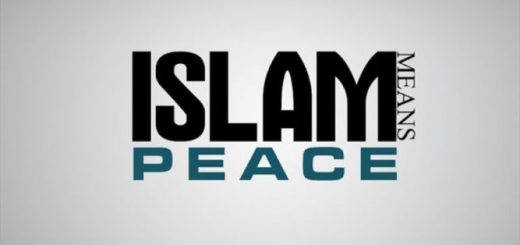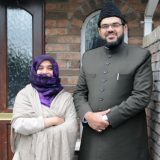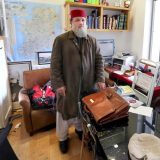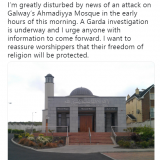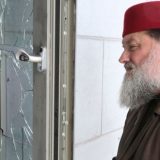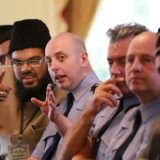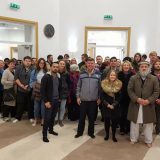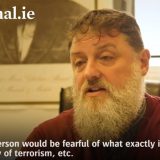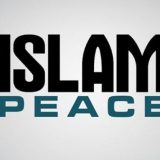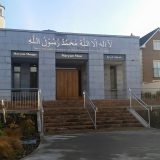Live on Liffey Sound FM (15-Nov-2017)
Originally recorded live on Liffey Sound FM on November 15, 2017, the program was called “From the old to the New, meeting new communities”.
The interview with Kamran Zahid and Rabeeb Ahmad Mirza by the host, Brendan Hackett (20 minutes) starts at 39:55 from this link.
The transcript of the interview was created by the webmaster of muslimwritersguild.ie. Some spoken English phrases (for example, “basically”, “umm”, “you know”, etc) were removed, re-iterations were removed, coughs, laughs or other non-verbal voices were removed, and in some instances, the exact wording was modified to fit the message. We apologize for any errors created by this process, mis-spellings, or missed conversation.
Host: Now, it’s the questions I mentioned above that we really want to get into. But you’re kind of different from other new communities, insofar as you’re a religious community, which dates back as far as 1889. I’m just going to run through this and if I’m saying the wrong things, tell me, but I just want to deal with it very quickly.
That your Islam faith rejects violence and preaches peace. An ideal in itself that was rejected by more fundamentalists and led to your members being persecuted.
You believe that your religion’s founder was in fact the second coming of Jesus awaited by Muslims, and that you believe your spiritual leader or Caliph is elected by God, and is the direct successor of the Prophet Muhammad.
Am I correct in all that?
Kamran: Yes
Host: Presumably you’re here to promote the Islamic faith, would that be right?
Kamran: Yes, our aim is that where we are living, we should integrate ourselves and we should promote peace. Because our founder has told us there is no more violence in Islam, and if you want to promote your religion, you should promote peacefully through peace and love. And that’s why our motto is also “Love for All, Hatred for None”, and we’re trying very hard to work on that.
Host: Would any of your people have come to escape the persecution?
Rabeeb: Actually in 1974, our community was declared by the Pakistani general assembly, by law and constitution, that we are outside the pale of Islam. And further this aggravated when in the early 80s, General Zia ul Haq, who was the Prime Minister of Pakistan, he introduced an ordinance known as Ordinance 20, and that deprives us from our basic Islamic rights. For example if I were to say Assalmo Alaikum or peace be upon you, if I were to give the call to prayer, I could be penalized. And there are other such steps that even could have the death penalty. So the problem is that due to this severe persecution, a lot of our members have now migrated to the European countries, the western Countries, where we have the freedom of religion and freedom of expression to express our faith.
Host: Okay, you first came to Ireland in the 70s, is that right?
Rabeeb: … 80s is when a few of our members actually came here. But the community, I should say the first convert, was an Irish woman, a lady by the name of Kathleen O’Bryne, and she converted in 1926. So she was the actual first convert to the Ahmadiyya Muslim Association. And thereafter, there were a few converts. The Imam of the Galway mosque, Mary Mosque, Ibrahim Noonan, he’s the first Irish Imam here in Ireland. So we have a few converts as well, but initially in 1926 was our first convert, but the community started to grow in the early 80s.
Host: When do you come through Lucan, and why, and how?
Kamran: …In early 2000, a few of our community members came as professional doctors. And they came here as doctors to work here in Ireland, and have chosen to live in Lucan, because it was peaceful and beautiful. That was the reason they came to the Lucan side. And from last 6-7 years, our community members have grown, because we have also our community centre here for the prayers, and that’s why most of the members from our community are living in the Lucan area.
Host: I think you have about 450 in Ireland? Is that right? How many would be in Lucan?
Kamran: Yes, most of them are in Lucan
Host: Where are you, dotted around the place?
Rabeeb: About Foster Walk, and just nearby here, actually nearby the middle area. We have about at least 100 members living here in Lucan and around in the suburbs. There are some in Clondalkan, a few in Tallaght, but most are in Lucan area.
Host: Your headquarters is now in London. How many would have come directly from London, or how many came from Pakistan, or other parts?
Rabeeb: In the 80s, we had about 6 or 7 families, but most of them were located in Galway. From London, over the past few years, we’ve had about 20 families that have come here. But there has been direct migration from Pakistan. Mostly the members of the community are migrants from Pakistan who have suffered persecution. So I would say 40 or 50 percent of the community are migrants from Pakistan.
Host: Would families have come together, or…?
Kamran: It depends, as you know we are still getting persecuted in Pakistan. Even in 2008, there was a huge attack in our 2 mosques, and there were more than 100 people killed from our community. Most of the time, one person is coming out. Because they are trying to kill the person who’s the head of the family. So that’s why we are trying to save those persons who have threats on their life so that he’s going to come first, and then he’s going to save the rest of the family.
Host: How many who would have come here would they have spoken English?
Rabeeb: A few of them. Generally because, if they are doctors by profession, they come here on a professional basis to further their profession. There are a few from Pakistan that do know the English language, but there are some that don’t. But we are also trying to get them involved in classes, short courses for learning the English language. They’re trying their best to also integrate into society with those means as well.
Host: Would many of them have their parents or grandparents back home?
Rabeeb: Yes, there are many that are still back home due to circumstances that do not allow them to leave Pakistan. There are some other reasons why they can’t leave. But generally, if they do get an opportunity, then they do leave. But you know, if they can’t then it’s something that…
Host: Do you people that are here, can you go back to visit?
Rabeeb: Yes, we can go back to visit Pakistan
Host: You won’t get arrested, or whatever?
Rabeeb: The thing is that obviously we have to abide by those restrictions that are implemented upon us. You can’t call a mosque a mosque, you have to call it a place of worship. So we are restricted in the terminology we are using. At the end of the day, there are still good people living in Pakistan.
Kamran: If your’e going back, there is still risk on your life. Few years back, one of our doctors who was living in Canada, he just went there as a volunteer to work. We have our own hospital in Pakistan, a heart institute. And unfortunately, that guy was killed there as well. He was a Canadian citizen. Unfortunately, this is a risk. Those people that want to go because they have their parents and family, then there are taking some risk when they’re going back. Every time you are going back, you are not going without the risk. You have to realize yourself that you are going back with a huge risk, maybe you can lose your life as well.
Host: What were the big things when people would come, say people who didn’t speak English, land in Ireland. Do they know what Ireland was and where it was? But obviously if you have doctors and more educated folk. But generally,…
Rabeeb: Generally, for example, there was one member of our community, he was told about Ireland. First he wanted to come to UK, but due to some circumstances he couldn’t come to UK. But when he was told about Ireland, he said where’s Ireland. We said it’s right next to UK.
The education level in Pakistan to some degrees, as in the Western countries, it’s still relatively low. Unfortunately, they don’t have the amenities we have and the facilities as well. A little bit more distinctive countries, the US or Canada, they know about that. I mean, some do know about Ireland, but some haven’t.
Host: Firing quick questions because the time is against us. The weather, is that an issue for them?
Kamran: No, it’s cold but we are used to it. A few months, and we feel at home.
Host: What about food, do they miss the food from home?
Kamran: In Lucan, to be honest, there are plenty of shops. You can buy home food. Also, when are living in any country or community, we try their different foods as well. That’s not an issue for us at all. When the people are coming new and they are living in hostels they are only getting Irish foods to eat.
Host: And what about the kids, how do the kids in school,…
Rabeeb: The kids are integrating. They’re growing their circle of friends as well. There’s absolutely no problem in that regards.
Host: But landing here, where it’s all English, and they haven’t a clue, is that a problem?
Kamran: No that’s not a problem. In these days even in Pakistan, they learn English from nursery school. Kids have no problem at all in this regards.
Also we have our youth organization, where we are trying ourselves to engage our youth in the society in which they’re living to better integrate them properly
Host: Did you encounter generally racial discrimination or hostility. I know in Ballybrit, earlier this year, there was some attacks on your mosque over there, I think in the aftermath of the Islamic terrorist attacks. Have you encountered any hostility here?
Rabeeb: The Irish people are very good people here. As they say it’s a land of saints and scholars. There are saints and scholars here. It’s only a fraction of people, sometimes there’s a rotten apple in the barrel. Sometimes it does happen. We’re holding a stall on the weekends, an information stall. We get some good responses and we get some negative responses. If we’re called terrorist or if we’re called this and that, we actually invite people and come and ask us, come and learn about Islam. Don’t judge a book by its cover. If the media is just portraying ISIS or the extremist groups, they should also try find out the reality of Islam. It happens on a small basis, but again the Irish people, and what we experience, they’re very good people.
Kamran: And also, we are the only community in Islam that are fighting against extremism. … We are distributing, for example a flyer, with a message of peace, and we are distributing, each year around 100,000 flyers all over Ireland.
Host: Going to stop you there, galloping on… a big and cultural difference obviously is the whole question of women. Which is probably epitomized in the Irish context, when they seem Muslims with the burqa. Do your women wear the burqa?
Rabeeb: Yes, you see even when you look in the bible. We see that women, or even nuns nowadays, nuns cover themselves, or even Mary is depicted ..
Host: …not their eyes, not their whole face
Rabeeb: What the Promised Messiah, or the Holy Prophet saw has taught is there’s no harm in showing the face. What in actuality is needed from women and men as well. Where women have been told to lower their gazes and also to cover themselves. Men have also been told to lower their gazes.
Host: I’ve never seen a man in a burqa
Rabeeb: The reality behind this is… if I were to explain it in this manner. There’s always going to be physical attraction between the two sexes. In one sense, God Almighty has revealed these commandments to stop immorality within society. So this is what we believe, that Islam is here to create a moral society. You know women can work, and go out into society. And men can also go and work in society. But these are the limitations that God Almighty has given us, and this is the dress code that God Almighty has given us.
Host: The notion that when foreigners go to your country, they have to respect the thing about the drink and cover their heads. Is there any half-way measure? Rather than the whole full burqa, the hijab, is that a compromise?
Kamran: Basically it depends on the person. Because Islam doesn’t say that you must have to wear that. It’s about yourself, if you like to do that you can do it. For example, I have a wife, and she’s not covering her face, only her head, that’s it.
Host: Is that up to the man or up to the woman?
Rabeeb: It’s up to the women. You cannot force a woman to wear the burqa or the hijab. That’s up to her
Host: Is it? I’m terribly sorry, I’d love to continue, and we might do it at a different forum. But I want to say thank you very much to Zahid and Rabeeb for coming in and sharing all that with us. We hope you will continue to settle happily here, and all your community.

